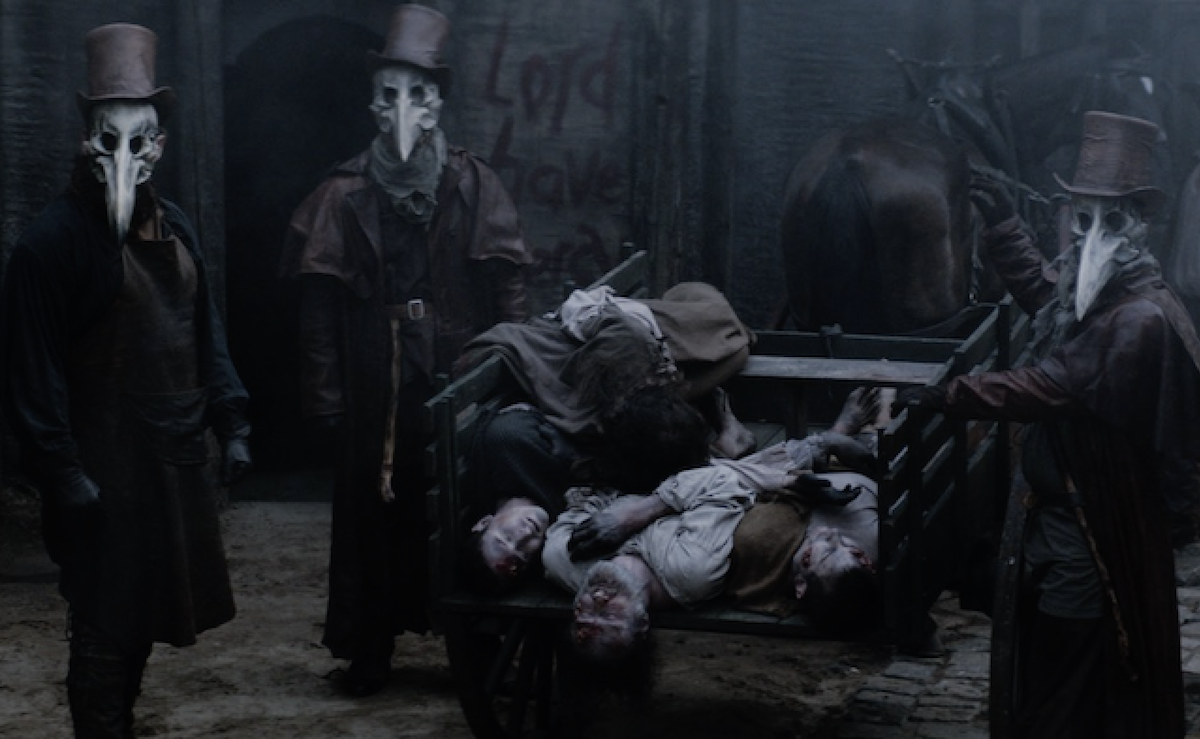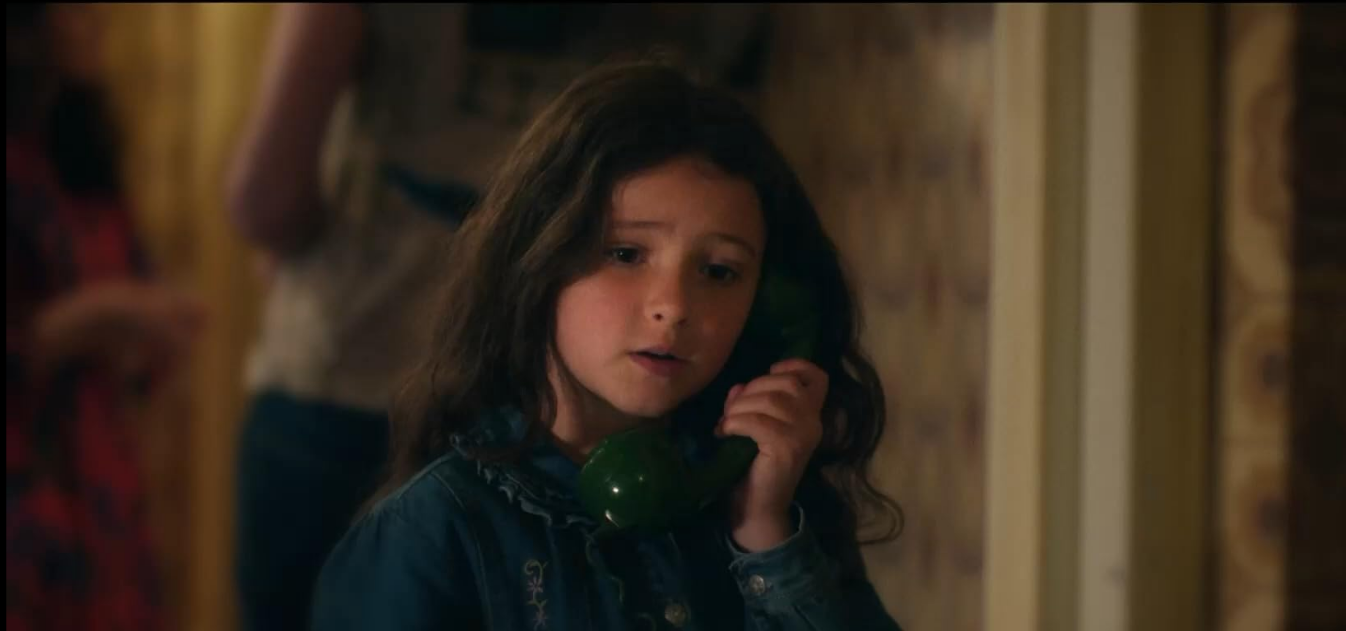Movies
[Fantasia Review] The Witch Trials of Neil Marshall’s ‘The Reckoning’ Tread Familiar Ground

The Reckoning is a period film set in 1665 during the Great Plague in England. The opening text provides the context and also introduces the concept of Witch Finders, individuals who have been granted nearly unlimited power to retain, interrogate, and punish individuals who are accused – and inevitability found guilty – of witchcraft.
The two somewhat disparate concepts intersect in the tale of Grace Haverstock (Charlotte Kirk, a co-writer along with Edward Evers-Swindell and director Neil Marshall) who finds herself in a terrible situation. Her husband, Joseph (Joe Anderson) has contracted the plague and, rather than risk giving it to his wife and new baby Abigail, he hangs himself outside their home. Without a husband, Grace runs afoul of predatory landlord Pendleton (Steven Waddington), who is more than willing to accept a carnal substitute instead of cash to cover the rent. Adversity and trauma have made Grace resilient, however, so she demurs Pendleton’s verbal and physical advances. Unfortunately, this winds up complicating her situation.
To avoid humiliation at the local tavern, Pendleton fuels public fears about the plague and Josef’s death. He incites hysteria in the local simpletons about Grace and they immediately brand her a witch. In no time, they’ve attacked her, thrown her in shackles and burned down her home. Grace is then locked up in the castle dungeon and made to stand public trial, which is presided over by famed Witch Finder, Moorcroft (Sean Pertwee), who also happens to be the man responsible for burning Grace’s mother (Emma Campbell-Jones) as a witch.
So begins Grace’s literal and figurative trial for survival…
After last year’s Hellboy was marred by studio interference, The Reckoning feels like a return to Neil Marshall’s epic period work on television series like Game of Thrones and Blacksail. The difference is that this plays more like a small-scale narrative that is content merely to use its historical event as a backdrop. The plague is little more than a plot device that pops up when it’s convenient and there is seemingly no interest in exploring how Grace’s plight might reflect the challenges of being a woman in the 17th century. The sole exception is Grace’s friend Kate (Sarah Lambie), who is regularly abused by her husband for speaking up.
The Reckoning is principally interested in Grace’s torturous trial (with emphasis on the torture). This is a film that regularly depicts its heroine in pain: Grace is flogged, stabbed, prevented from sleeping, and – in the film’s most uncomfortably sexualized moment – tortured vaginally with a medieval weapon wielded by Moorcroft’s assistant, Ursula (Suzanne Magowan), a burnt woman with her own (un)surprising backstory.
Thankfully the brutality isn’t on par with a religious snuff film like The Passion of the Christ; Marshall tends to imply violence, then cut back to the bloody aftermath. Still, this becomes mind-numbing when the majority of the narrative is dominated by Grace’s four days of torture at Moorcroft’s hand.

Clocking in at nearly two hours long, the narrative falls into a repetitive rhythm once Moorcroft shows up roughly one third of the way in. The Reckoning is broken up by title cards counting the days and Marshall and his co-writers do little to shake up the action: Grace hallucinates about Josef, her mother and The Devil (Ian Whyte), then she is tortured, then she tries to convince Pendleton’s pre-teen helper to supply her with information about baby Abby. Despite the verbal confrontations between Grace and Moorcroft, The Reckoning lags until it hits its action-packed finale with around twenty minutes remaining and the stakes become life and death.
The production looks good (Hungary stands in for Northern England) and Marshall’s direction of the action set-pieces is predictably solid, in particular the attack on Grace’s farmhouse and the sustained climax. Strangely the use of jump scares, which were so deftly handled in The Descent, are ineffective here: Grace’s nightmares are clearly dreams from the get-go, and, disappointingly, they aren’t scary or memorable.
Kirk, who appears in nearly every scene, is undoubtedly The Reckoning’s anchor, but she’s not the most emotive performer. Her arc – from meek wife to vigilante icon – is fine, but there is a clear reluctance by the production to dirty her up. The hair, makeup and costuming is too model perfect to be believable for the period and Grace’s life on a farm. Even more problematically, it’s difficult to buy into the injuries Grace sustains when everything is hand-waved away in the last act so that she can become a 17th century Linda Hamilton.
The supporting cast, comprised almost entirely of men, are all hissably evil (Waddington’s Pendleton is eminently punchable). The exception is Pertwee, who imbues Moorcroft with greater characterization than the script demands. More insight into his hypocritical, misogynistic beliefs, as well as his relationship with Ursula, would have helped to inform, and possibly even elevate, the conflict with Grace. As it stands their battle of wills comes off as tired and formulaic.
Altogether, The Reckoning isn’t quite the return to form for Neil Marshall that genre fans might have hoped for, but it’s nowhere near the misfire that Hellboy was. The film looks good and is shot well, particularly for audiences with an affinity for torture. Alas, the central conflict between witch finder and accused witch proves too safe and repetitive to be truly memorable.

Movies
Matilda Firth Joins the Cast of Director Leigh Whannell’s ‘Wolf Man’ Movie

Filming is underway on The Invisible Man director Leigh Whannell’s Wolf Man for Universal and Blumhouse, which will be howling its way into theaters on January 17, 2025.
Deadline reports that Matilda Firth (Disenchanted) is the latest actor to sign on, joining Christopher Abbott (Poor Things), Julia Garner (The Royal Hotel), and Sam Jaeger.
The project will mark Whannell’s second monster movie and fourth directing collaboration with Blumhouse Productions (The Invisible Man, Upgrade, Insidious: Chapter 3).
Wolf Man stars Christopher Abbott as a man whose family is being terrorized by a lethal predator.
Writers include Whannell & Corbett Tuck as well as Lauren Schuker Blum & Rebecca Angelo.
Jason Blum is producing the film. Ryan Gosling, Ken Kao, Bea Sequeira, Mel Turner and Whannell are executive producers. Wolf Man is a Blumhouse and Motel Movies production.
In the wake of the failed Dark Universe, Leigh Whannell’s The Invisible Man has been the only real success story for the Universal Monsters brand, which has been struggling with recent box office flops including the comedic Renfield and period horror movie The Last Voyage of the Demeter. Giving him the keys to the castle once more seems like a wise idea, to say the least.















You must be logged in to post a comment.